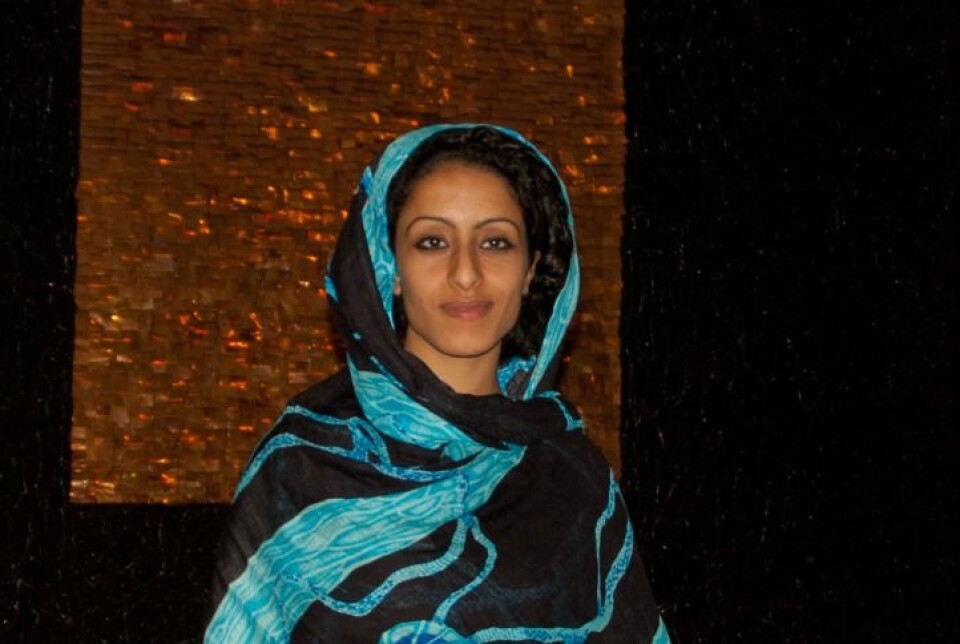
Africa's last colony
The winner of the Student Peace Prize in 2009, Elkouria Rabab Amidane, was last Friday at Gløshaugen to speak about the occupation of her homecountry, Western Sahara, and the human rights violations taking place there.
Translated by: Trygve Norum Lunås
Until 1975 Western Sahara was a Spanish colony, but when the Spanish withdrew in 1975, Morocco invaded the country from the north and Mauritania from the south. Both countries claimed Western Sahara to be their territory from before the colonization.
The case was put forth in the International Court of Justice, the primary judicial organ of the United Nations, which declared Western Sahara independent and rejected both Morocco and Mauritania's claims to the land. Mauritania quickly withdrew, but the demand of retreat was ignored by Morocco, who instead escalated the occupation by arranging a «Green March» in which 350 000 civilian Moroccans migrated to Western Sahara.
The Moroccan Iron Fist
During the past 35 years of Morrocan occupation, the situation has reached it's extreme. Western Sahara is today divided by a 2 200 kilometer long wall erected by the Morrocan army. In comparison the wall is three times the length of the Gaza Strip and 15 times that of the Berlin Wall. The wall is surrounded by barbed-wire, military guards and approximately one million landmines. It has been given the name «The Red Line».
The Moroccan government has, among other things, rewritten the entire history of the country, so that schoolchildren don't learn anything about Western Sahara being an independent state.
– The first time I saw the flag of Western Sahara was when I was a teenager. The Morrocan government has made the flag illegal by law, says Amidane.
Just talking about Western Sahara can be a dangerous act, and Amidane's family hardly mentioned the country during her childhood.
– My parents didn't dare talking about our country. They were to frightened of the potential consequences, she says.
Arrests and torture
In 2006 Amidane's brother was arrested and sentenced to five years of imprisonment because of his work as an activist, and for being a voice in Western Sahara's struggle for independence.
This strongly affected Amidane and she has since then worked persistantly as an activist, which is very hazardous in the occupied country. She can tell about several accounts of police brutality against demostrators and peace campaigners in which she herself has been involved.
– A friend of mine was hit and beaten so hard that she lost one of her eyes. Another one has had her stomach slit open by the police. My worst experience was being tortured and subsequently left hanging by one arm for an entire day, says Amidane.
UN forces are silent witnesses
There are UN troops stationed in Western Sahara, but the paradox is that they do not have authority to intervene if they observe infringements on the human rights. Amidane can tell that the people of Western Sahara have little faith, if any, in the UN forces, and describes them as «silent witnesses».
– In Western Sahara we call the UN «The United Nothing». They never intervene, not even if demonstraters are attacked and beaten up by the police. De can only stand by and watch, like silent witnesses, says Amidane.
Norway's contribution
The Norwegian Support Committee for Western Sahara (NSCWS) is a membership organisation which has as it's goal the implementations of the several UN resolutions which give the people of Western Sahara a right to self-determination.
Before the Student Peace Prize winner Elkouria Rabab Amidane held her talk, Erik Hagen, a journalist and researcher from The Future in our hands (FIOH), held a brief speech about the occupation. He pointed out the NSCWS as playing an important role in the country's struggle for freedom, but both he and Amidane agreed that if Western Sahara is to have it's lawful independence, there must be changes coming from the political level as well.
– Everyone I tell my story to wants to help, and all of the Norwegian youth parties, as well as almost every of their mother parties support our cause, but still there is little being done, Amidane says.
Erik Hagen also urges everyone who wants to help to do so.
– There is a huge need for support, and I would encourage everyone who wants to contribute to contact either myself or the Norwegian Support Committee, he says.
Uncertain future
Amidane is mainly positive to the future, and believes that as long as they keep up their fight, Western Sahara will eventually have it's freedom, but she is anxious of the present situation;
– People have started to migrate out of the cities and into the desert because of the terrible conditions, and we are afraid that there soon will be a war, she says.

































